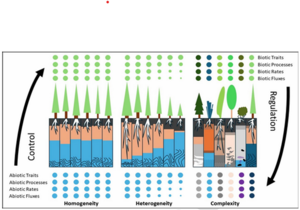Towards a geodiversity- Biodiversity nexus in terrestrial ecosystems

Challenges related to global change require an integreted approach to managing natural systems. These systems exhibit a high degree of complexity, contributing to ecosystem functioning, biogeochemical cycles, and responses to climate change. Sustainable action to combat the impacts of climate change must consider this ecological complexity, to avoid implementing strategies that while solving one aspect of the problem risk exacerbating others. This applies equally to protecting, restoring and sustaining terrestrial ecosystems to halt biodiversity loss.
The paper published in the journal Earth Science Reviews aims to provide a new conceptual perspective to address this complexity, with a focus on terrestrial ecosystems and the functional linkage between geodiversity and biodiversity, both key aspects of nature's diversity.
In this study existing approaches are evaluated, aiming to provide a comprehensive conceptual framework, including quantitative, qualitative, and functional characteristics of natural systems. Defining and classifying types of entities (e.g., organisms, minerals) and characterising differences (e.g., heterogeneity, change) at appropriate scales are central to the framework.
Bibliographic reference
Beierkuhnlein C., Pugh B., Justice S., Schrodt F., El Serafy G., Karnieli A., Manakos I., Nietsch L., Peñas de Giles J., Peterek A., Poursanidis D., Zwoliński Z., White T., Wozniak E., Field R., Provenzale A. (2025). Towards a comprehensive geodiversity-biodiversity nexus in terrestrial ecosystems. Earth Science Reviews, vol. 264, 105075, https://www.sciencedirect.com/science/article/pii/S0012825225000364.
For information: Antonello Provenzale, CNR-IGG (antonello.provenzale@cnr.it).